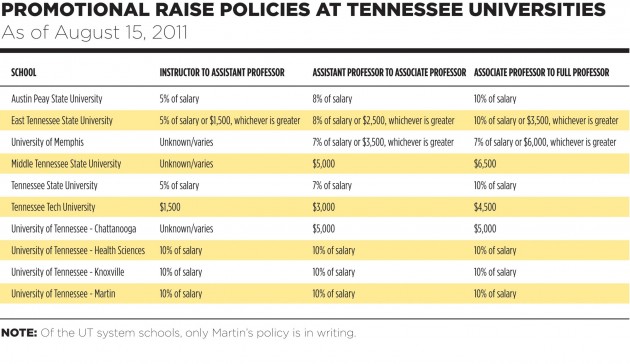
Full-time tenured faculty members at Tech have not seen a promotional raise increase since the late 1990s, a problem that the University looks now to correct.
Sep. 26, Tech’s faculty senate presented its concerns to President Bob Bell. Bell promptly appointed five members to a committee that will compare promotional raise rates at Tech to other schools to determine a fair market rate based on experience, ranking and national rates for full-time faculty at each level. The committee aims to finish its investigation in time for the spring 2012 budget proposal.
“I brought it up back in the ‘90s just after I had just been appointed to the faculty senate,” Jeff Roberts, history department chair and president of Tech’s faculty senate. “Apparently, no one has brought it up since.”
After Roberts took his concerns to University administrators, promotional raises were increased to the current rates of $1,500 for a promotion from instructor to assistant professor, $3,000 for a promotion from assistant professor to associate professor, and a raise of $4,500 for a promotion from associate professor to professor.
While these numbers were an improvement at the time, Tech falls almost in last for its promotional raise rates when compared to other public universities in Tennessee, including Tennessee Board of Regents institutions and schools within the University of Tennessee system. For example, at Middle Tennessee State University, promotions at or above the assistant professor level bring raises of $2,000 more than what Tech currently offers. The UT system employs a flat 10 percent promotional raise for all levels at most of its schools.
“There were some complaints among the faculty that they were falling behind their colleagues in what they were earning and, in investigating that, I found the discrepancy,” Roberts said.
The committee will also look at the impact that an increase will have on the budget, according to Kurt Eisen, interim associate dean of the College of Arts and Sciences and chairperson for the president’s promotional raises committee.
Each year, there are a half a dozen to a dozen promotions within the University. Based on those numbers, the impact that an increase in promotional raises would have should be manageable, but only if it is worked into budget planning. It is for this reason that the committee will attempt to have information available for spring budget planning to avoid having to wait another year.


